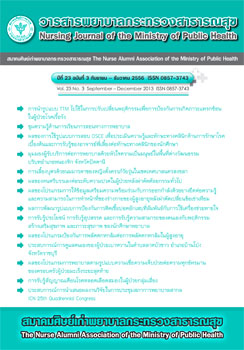มุมมองผู้รับบริการต่อการพยาบาลด้วยหัวใจความเป็นมนุษย์ในพื้นที่ต่างวัฒนธรรม บริบทอำเภอหนองจิก จังหวัดปัตตานี
Main Article Content
Abstract
การวิจัยครั้งนี้เป็นการวิจัยเชิงคุณภาพ (qualitative research) เพื่อศึกษามุมมองผู้รับบริการต่อการพยาบาล ด้วยหัวใจความเป็นมนุษย์ในพื้นที่ต่างวัฒนธรรม โดยศึกษาจากกลุ่มผู้รับบริการที่มารับบริการ ณ โรงพยาบาล หนองจิก จังหวัดปัตตานี จำนวน 50 คน ช่วงเวลา 1 ตุลาคม 2554 – 30 กันยายน 2555 เครื่องมือที่ใช้เป็น แบบสอบถามและแบบสัมภาษณ์ ประกอบด้วย 2 ส่วนคือ (1) ข้อมูลส่วนบุคคลของกลุ่มตัวอย่าง (2) มุมมองของ กลุ่มตัวอย่างต่อการพยาบาลด้วยหัวใจความเป็นมนุษย์ในพื้นที่ต่างวัฒนธรรม ซึ่งประยุกต์ตามแนวคิดการดูแล ของโรช (Roach, 1992)
ผลการวิจัยพบว่า มุมมองผู้รับบริการต่อการพยาบาลด้วยหัวใจความเป็นมนุษย์ในพื้นที่ต่างวัฒนธรรม อำเภอหนองจิก จังหวัดปัตตานี สามารถสรุปเป็น 2 ประเด็นหลักดังนี้ 1. ความหมายการพยาบาลด้วยหัวใจความ เป็นมนุษย์ในพื้นที่ต่างวัฒนธรรม ประกอบด้วย 1.1 การดูแลอย่างเท่าเทียม ด้วยความเอาใจใส่ดุจญาติมิตร 1.2 ความเข้าใจในบุคคลต่างชาติ ต่างศาสนา 1.3 ยอมรับความแตกต่างระหว่างบุคคล 2.การปฏิบัติการพยาบาล ด้วยหัวใจความเป็นมนุษย์ ในพื้นที่ต่างวัฒนธรรม ประกอบด้วยการดูแลเป็น 5 องค์ประกอบ คือ 2.1 ความเห็นอก เห็นใจ (compassion) ปรารถนาที่จะให้ผู้อื่นเป็นสุข 2.2 ความสามารถ (competence) ประกอบด้วย 1) ด้านความรู้ ความสามารถสอดคล้องกับวิถีชุมชน 2) ด้านทักษะ/ประสบการณ์ความชำนาญและการตัดสินใจของแต่ละบุคคล 2.3 ความเชื่อมั่น (confidence) ความเชื่อถือ ความศรัทธาและความไว้วางใจ 2.4 ความมีสติรู้ชอบ (conscience) เป็นความรู้สึกว่าอะไรควรทำ ไม่ควรทำ และ 2.5 ความมุ่งมั่น (commitment) อดทน เสียสละ กระตือรือร้น ตั้งใจ ที่จะกระทำการพยาบาล
ผลการศึกษาครั้งนี้ สามารถนำมาใช้ในการกำหนดรูปแบบการให้บริการพยาบาลแนวใหม่ ที่ตอบสนอง ความต้องการของประชาชน เน้นการสร้างเสริมสุขภาพแบบองค์รวม ภายใต้ความหลากหลายทางวัฒนธรรม
Clients’ Perspectives on Humanized Nursing Care within a Multicultural Context: A Case Study of Nongjik District, Pattani Province.
Angkana Wangthong*
Anuchit Wangthong*
Tounhananee watsen*
Wandee Suttarangsri**
Abstract
The purpose of this qualitative research was to study clients’ perspectives on humanized nursing care within the multicultural context. The participants were 50 clients having health services at Nongjik Hospital, Pattani Province. The tools consisted of 2 parts: 1) personal information of participants, 2) participants’ views of humanized nursing care within the multicultural context, developed by the research team based on Roach’s (1992) concept.
The results of personal information showed that 72% were female, 58% were Muslim, 70% were married, 34% were between 41 and 60 years old, 56% graduated from high school or equivalent, 26% were hired as general workers, and 42% had an annual income between 5001 and 10,000 baht. 62% had illnesses such as HT and DM, 64% received hospital services more than 6 times a year, 82% chose hospital services because of health insurance card holder’s privileges, 66% chose to come to the hospital because of its convenience, and 18% used public servant’s privileges. For the clients’ perspectives, there were two main themes: 1) The meaning of humanized nursing care within the multicultural context, which consisted of 1.1 providing equal care and treating everyone as relatives, 1.2 understanding different nationalities and religions. 2) Nursing practice - which consisted of 2.1 compassion, 2.2 competence including knowledge and capability consistent with community’s ways of life, 2.3 confidence, trust, and faith, 2.4 conscience - what should and shouldn’t be done, and 2.5 commitment including being patient, sacrifice, and responsible.
The result of this study could be used to improve or develop a nursing system in accordance with social and community needs and holistic health concern within the multicultural context.
* Nongjik Hospital, Pattani Province.
** Associate Professor, Faculty of Nursing, Prince of Songkla University.Article Details
บทความและรายงานวิจัยในวารสารพยาบาลกระทรวงสาธารณสุข เป็นความคิดเห็นของ ผู้เขียน มิใช่ของคณะผู้จัดทำ และมิใช่ความรับผิดชอบของสมาคมศิษย์เก่าพยาบาลกระทรวงสาธารณสุข ซึ่งสามารถนำไปอ้างอิงได้

